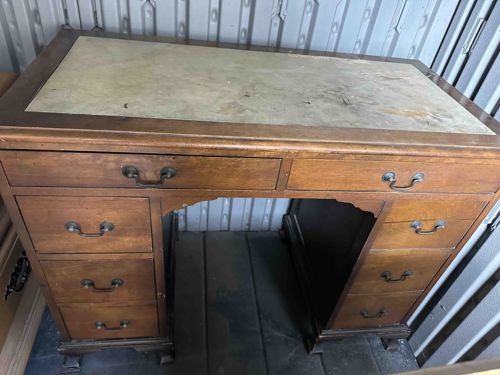
Vintage Wooden Kneehole Desk
This is a vintage wooden kneehole desk, likely constructed from a hardwood such as oak or walnut, given its rich, medium-brown finish with visible grain. The desk features a rectangular top framed by a wooden border, encompassing a center panel which appears to be a worn, lighter-colored inlay, consistent with what might have originally been a leather or linoleum writing surface. The inlay shows significant wear, discoloration, and some visible stains or scuffs, suggesting a long history of use and the need for restoration if a pristine appearance is desired. The desk is designed with a classic kneehole configuration, providing a central open space for a chair, flanked by two pedestals of drawers. The left pedestal has four drawers of varying sizes, while the right pedestal has three drawers. Above the kneehole, there are two additional smaller drawers under the desktop. All drawers are fitted with matching antique-style bail handles in a darker metal finish, possibly brass or iron, exhibiting some patina. The drawer fronts appear solid, and the construction suggests dovetail joinery for the drawers, indicative of quality craftsmanship, though this can't be confirmed without closer inspection of the drawer sides. The desk stands on short, sturdy legs with carved bun feet or similar decorative elements, providing a stable base. An ornamental carved apron or skirt frames the kneehole opening. The overall condition shows signs of age and use, including surface scratches, some finish loss, and the wear on the desktop inlay. Despite the wear, the structural integrity appears sound. The presence of 'Earle E. Smith, 2829 Swigert Road, Kettering, Ohio' stamped inside a drawer suggests this was either a custom-made piece, a piece from a local artisan, or perhaps a retailed item from that specific location, placing its potential origin or retail point in Ohio. This information could be crucial for dating and understanding its provenance. The style suggests an era from the early to mid-20th century, possibly 1930s-1950s, aligning with traditional office or library furniture designs.
AI-Generated Appraisal Disclaimer
Estimated Value
$350-600
Basic Information
Category
Furniture
Appraised On
February 26, 2026
Estimated Value
$350-600
Additional Details Provided By Owner
User Provided Information
Wooden desk, may have had leather inlay top. Inside of drawer stamped with Earle E. Smith, 2829 Swigert Road, Kettering, Ohio
Item Description
This is a vintage wooden kneehole desk, likely constructed from a hardwood such as oak or walnut, given its rich, medium-brown finish with visible grain. The desk features a rectangular top framed by a wooden border, encompassing a center panel which appears to be a worn, lighter-colored inlay, consistent with what might have originally been a leather or linoleum writing surface. The inlay shows significant wear, discoloration, and some visible stains or scuffs, suggesting a long history of use and the need for restoration if a pristine appearance is desired. The desk is designed with a classic kneehole configuration, providing a central open space for a chair, flanked by two pedestals of drawers. The left pedestal has four drawers of varying sizes, while the right pedestal has three drawers. Above the kneehole, there are two additional smaller drawers under the desktop. All drawers are fitted with matching antique-style bail handles in a darker metal finish, possibly brass or iron, exhibiting some patina. The drawer fronts appear solid, and the construction suggests dovetail joinery for the drawers, indicative of quality craftsmanship, though this can't be confirmed without closer inspection of the drawer sides. The desk stands on short, sturdy legs with carved bun feet or similar decorative elements, providing a stable base. An ornamental carved apron or skirt frames the kneehole opening. The overall condition shows signs of age and use, including surface scratches, some finish loss, and the wear on the desktop inlay. Despite the wear, the structural integrity appears sound. The presence of 'Earle E. Smith, 2829 Swigert Road, Kettering, Ohio' stamped inside a drawer suggests this was either a custom-made piece, a piece from a local artisan, or perhaps a retailed item from that specific location, placing its potential origin or retail point in Ohio. This information could be crucial for dating and understanding its provenance. The style suggests an era from the early to mid-20th century, possibly 1930s-1950s, aligning with traditional office or library furniture designs.
Related Tags
Get Your Items Appraised
Instant estimates of your treasures with AI-powered instant appraisals